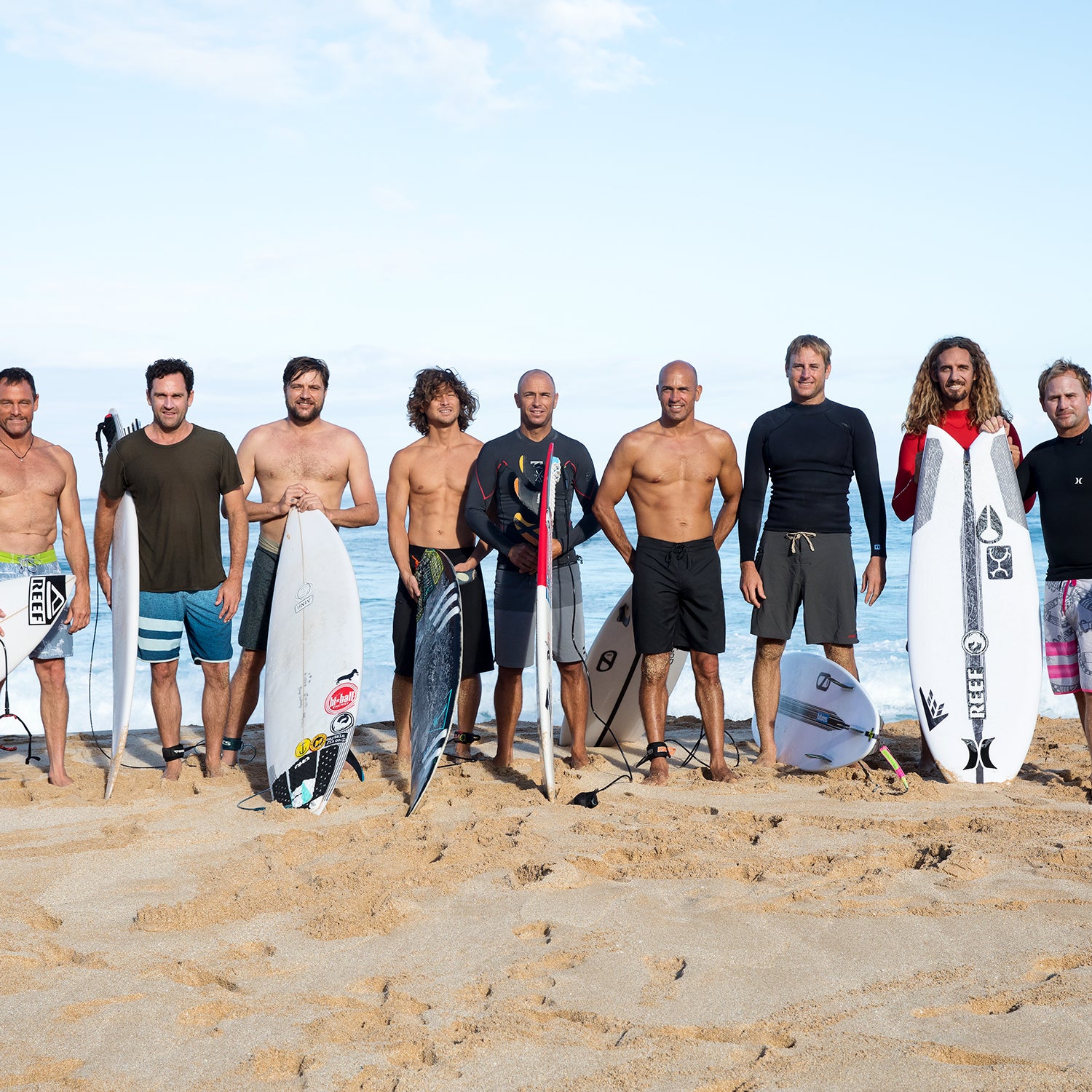For a movie so outwardly uncomplicated, , by directors (and brothers)��Jeff and Michael Zimbalist,��is remarkably hard to define. The simple version goes like this: Momentum Generation is a gorgeously shot feel-good documentary, filled with spectacular surfing footage on waves big and small all over the world, about the lives and friendships of eight male pro surfers and one surf filmmaker who all got to know each other back in the early 1990s, when that surf filmmaker was producing a low-budget surf flick called .
Everyone��who paid attention to surf media in the 1990s will have heard of Momentum, not because it was artfully made—it wasn’t—but because the 1992 film's��screechy punk/metal soundtrack and hyper-aggressive slash-and-aerial surfing really did announce the arrival of a new generation of young dudes who shredded waves into way smaller pieces than the reigning old dudes.��Every surfer who paid attention to surf media for even a portion of the past 25 years will also know the names and faces of most if not all of the stars of��Momentum Generation: Shane Dorian, now widely recognized as the world’s greatest big-wave surfer; Pat O’Connell, co-star of the sweet-but-canned surf flick ; Rob Machado, arguably the only pro surfer ever to have built a lucrative career on a combination of brilliant surfing and lovely hair; Benji Weatherly, social glue and tender heart of the crew; Ross Williams; Kalani Robb; Taylor Knox; and, of course, Kelly Slater, the best and most famous surfer all time.
This brings me to a more complicated way of characterizing Momentum Generation—as an��exuberantly hagiographic work of celebrity journalism trading openly on the putative pleasures of glimpsing inside the charmed lives of people we are presumed to already��admire and envy.
The film, which ,��begins with the deft establishment of thumbnail backstories for each surfer: Slater talks about growing up working-class in Cocoa Beach, Florida, and the emotional toll of his father’s drinking and his parents’��divorce; Knox talks about watching his father beat up his mother; Robb describes painfully impoverished days on the beach, with no adult supervision. The boys excel at surfing, become friends while rooming together at Weatherly’s home on Oahu, and thus begins a joyous Act Two in which they win contests as the aspiring filmmaker Taylor Steele—of the original Momentum, not Momentum Generation—launches their collective journey toward surf-world fame.
The emotional center of Momentum Generation—the Act Two crisis, if you will—hinges on two very different events. The first comes when Slater has two world titles and is chasing a third, and suddenly finds himself behind Machado in the rankings. Machado and Slater face each other in a semifinal at the 1995 Pipeline Masters contest and trade perfect waves that put Machado on track to fulfill his dream of becoming world champion. Machado emerges from a big tube and Slater, sitting upright on his surfboard nearby, raises one hand to offer a high five. Machado veers to consummate that high five, and the surf media goes nuts with ecstasy over this apparent display of brotherly love and shared passion for surfing in a seemingly cutthroat competitive setting.
The enduring nature of that ecstasy, the legend of the High Five Heard ’Round��the Surf World, has always been testament more to the excruciating lack of meaningful content in surf competition than to the significance of the high five itself—because, really, who cares? So I appreciate the willingness of Momentum Generation to explore darker aspects of this incident. Slater, it turns out, by luring Machado into that high five, and for reasons that have to do with arcane surf contest rules, cost Machado priority for the next wave. That loss of wave priority made it easier for Slater to beat Machado and seize the world title for himself, crushing Machado’s dreams and plunging him into self-doubt and despair.
Several talking heads argue that Slater did this on purpose—a genuinely ugly move, if true, exploiting a friend’s essential kindness and desire to be liked as a way of destroying him. Machado clearly leans toward that explanation himself, and fairly seethes with bitterness as he talks about it in Momentum Generation; Slater rejects this interpretation outright and appears hurt by the implication.
The second big turning point in the film��comes when an older surfer named Todd Chesser, longtime mentor to the boys,��dies in giant surf off Oahu's North Shore in 1997.��Momentum Generation��promptly��enters a blue period in which our grieving heroes drift apart and struggle to grow up, and one of the more peculiar aspects of surf culture begins to shimmer around the edges of the story. Machado, depressed about Slater’s high-five and Chesser’s death, and eliminated from the contest tour because of an injury, works to rehabilitate his career by making a solo surf film with Steele, director/producer of the original��Momentum. They come up with the idea of Machado taking��a soul-searching solo surf trip across Indonesia, with his hair in the long spectacular curls appropriate to a Central Casting seeker, and call it��.��
Putatively a documentary,��The Drifter��is good stuff: Machado achieves the last word in Spiritual Hair, is one hell of a beautiful surfer, and really does seem like a decent person. He looks great, in��The Drifter,��lying around by himself in foreign��hotel rooms, staring thoughtfully into mirrors and writing in his journal. He looks great alone on local Indonesian busses, staring moodily out the window as the world goes by, and alone on cool old motorcycles on country roads,��and alone on boat decks, staring at the sky. And if you’re wondering how he could really have been alone, given that every one of those scenes has to have been staged and that a film crew was clearly with Machado everywhere he went, well, that’s what I’m trying to talk about.��
Starting as far back as��The Endless Summer,��in 1964, surf movies have always been like porn: the action is the point, with a loose little storyline to break the monotony. Porn storylines are almost always fictional—pizza guy, remodel carpenter, office hanky-panky. Surf storylines, by contrast, are almost always documentary: two buddies chasing the summer around the world, searching for the perfect wave; depressed Machado growing out his hair and looking in the mirror for enlightenment. So many surf filmmakers have made so many such films for so long that the entire culture has grown comfortable with the idea of famous surfers participating in fabricated versions of their own lives—gorgeous, enviable, inspiring, but essentially fictional—and presenting them as real, or at least, real enough.��
In��Momentum Generation,��Steele and Machado even talk about making��The Drifter��in terms of their hope that it would recast Machado’s image in ways that might be good for enticing sponsors��going forward.��Momentum Generation��then uses footage from��The Drifter��to the same end that it was used in��The Drifter��itself: to create a mood of depressed��soul-searching and show viewers of��Momentum Generation��that, during the blue period when the boys were estranged from one another, things got, you know,��heavy. Put another way, the putative documentary called��Momentum Generation��lets us know (by accident, not because anybody cares) that the putative documentary called��The Drifter��wasn’t really a documentary at all, and then deploys putatively-documentary footage of clearly staged scenes from��The Drifter��as if they are real—or, rather, in the same spirit in which that footage was used in��The Drifter,��which is to say, with absolute comfort in the idea that any line between the real and the fabricated is itself an��illusion.��
It’s all so meta-meta-postmodern that I’d have to go back to graduate school to have any hope of accurately quantifying the sheer emptiness of its deepness. That quality oozes into��Momentum Generation��itself when the blue period yields to a joyous reunion of our heroes. Wiser and warmer from the passage of years, they rekindle old friendships in full view of what must have been a minor Air Force of camera drones supported by a SEAL Team Six of water photographers, in absolutely stunning sunset light—staging a core emotional moment in their lives as if it were a Miller Lite commercial.��
I don’t mean to say that��Momentum Generation��is not pleasurable to watch��and well made, because it is. Nor do I mean to say that these men are inauthentic and their friendships��insincere—because again, they come across as decent guys, and are appealing to watch and listen to. I mean only to say that image-fabrication has become so routine in the surf-flick genre from which��Momentum Generation��emerges that it becomes impossible to tell if you’re watching fiction or nonfiction, or if it even matters.��


